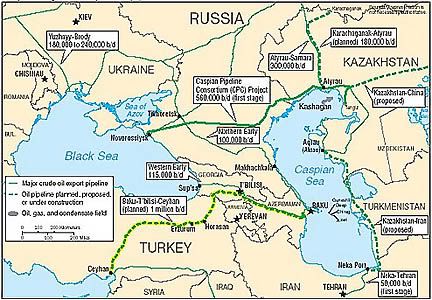The Caspian Region's Baku-Tbilisi-Ceyhan Pipeline Takes Pressure Off on Middle-East Oil
25 May 2005
Read here full article by Lech Mintowt-czyz, and HERE and HERE
The first drops of oil were pumped into the Baku-Tbilisi-Ceyhan (BTC) pipeline, at the Sangachal oil terminal, 25 miles south of the Azerbaijani capital Baku. But it will take another five months to fill along its whole length.
The pipeline will dramatically reduce reliance of western nations on Middle East oil.
The first shipment of Caspian oil from the Turkish port of Ceyhan is expected before the end of the year.
The 1,774 kilometer pipeline (1,050 mm size) runs from the landlocked Caspian Sea to the Mediterranean.
It starts in Baku, the captial of Azerbaijan then winds down south through Armenia and onto the Turkish Mediterranean port of Ceyhan.
It runs across Azerbaijan (449km), Georgia (235km) and Turkey (1,059km) until the oil terminal in Ceyhan on the Mediterranean.

The throughput capacity of the pipeline is 50 million tons of oil a year, or one million barrels of oil a day.
Caspian region's huge potential reserves of oil are thought to be the third largest on the planet. The underground reserve will come from the Azeri-Chirag-Gyuneshli oilfield in the Azerbaijani sector of the Caspian Sea which is capable of feeding into the pipeline 220 billion barrels of oil. Enough to meet current needs for eight years.
It is estimated the wider Caspian region has oil reserves bigger than those in both American continents, with the potential to provide the west's oil needs for 50 years. There are also proven reserves of gas at least as large as those controlled by Saudi Arabia.
To prevent sabotage, the line has been buried several metres underground for most of its length and will be guarded by local police forces.
Azerbaijan will gain from taxes and royalties on the oil, while Georgia and Turkey will benefit from transit fees.
Turkey is expected to earn between 140 and 200 million dollars every year in the first 16 years. Depending on the amount of oil channeled through, and the level of transit fees and operations services payments, between 200-300 million dollars over the next twenty years, or so.
The shareholders of the BTC (Baku-Tbilisi-Ceyhan) consortium are:
The big loser in this CBT pipeline project is Russia. Russia feels it has been cut out of the deal.British Petroleum (30.1%), the State Oil Company of Azerbaijan (25%), Unocal (8.9%), Statoil (8.71%), TPAO (Turkish Petroleum, 6.53%), Eni (5%), Itochu (3.4%), INPEX (2.5%), ConocoPhillips (2.5%), Total Oil (5%), and Amerada Hess (2.36%).
In fact, the pipeline will sap Moscow of some of its influence over the energy resource-rich Caucasus region.
The reason being that the CBT pipeline avoids Russian territory altogether - starts at Baku's Sangachal terminal and end ups running the bulk of its length through Turkey.
Russia's original ambitious "northern line" project of 1995,was to link the Caspian Sea with the Russian Black Sea port of Novorossick, with the pipeline running through the Chechen capital, Grozny. But in 1999, the Grozny link had to be abandoned following a wave of sabotage attacks by Chechen rebels fighting Moscow's rule.
Nadir Devlet, an analyst at Istanbul's Yeditepe University commented:
Current international oil price continues to hover above the 50 dollar a barrel mark. The market sees the CBT piple as a welcome boost in supply."Oil and natural gas from Kazakhstan and Azerbaijan, has been channeled to markets in the West through Russia. Russia controls the volume of exports and dictates the prices.
With the BTC pipeline, Azerbaijani oil production will NO longer depend on Russian policies. In the long run, the other former Soviet central Asian republics, Kazakhstan and Turkmenistan, may also link up with the CBT.
This weakens Russia's position in the energy-rich region.
Iran on the other hand [which some also view as another of the project's major losers] will not be affected by the BTC because for Tehran, the priority is to maintain control of Turkmenistan's natural gas exports [for which it acts as a conduit]".
But skeptics question the wisdom of constructing a strategically important pipeline through a region as politcally volatile as the southern Caucasus.
Azerbaijan and Armenia's bloody conflict over the enclave of Nagorno Karabakh in the mid-1990s remains unresolved and cross-border clashes still occur. Georgia's government, installed in 2003 after the "Rose Revolution" which toppled the country's pro-Moscow leaders, is grappling with break-away movements in the regions of Abkhazia and South Ossetia, which are backed by Russia. Environmental activists say the pipeline runs through a zone highly prone to earthquakes and have warned that any rupture in the pipeline could spell an ecological disaster, In Georgia, the pipeline's route runs through the Borjomi Valley, a potential tourist attraction.



0 Comments:
Post a Comment
Go to Latest Posting